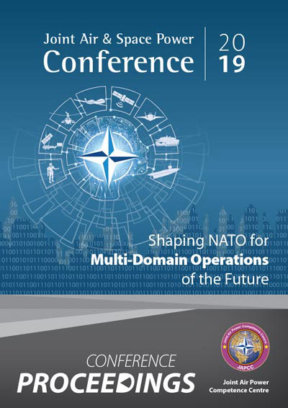Introduction
The JAPCC Conference, held in Essen, Germany from 8–10 October 2019, concerned itself with Multi-Domain Operations (MDO).
This paper aims to capture key messages from the conference. Rather than producing a chronological record of these discussions, it will introduce them thematically. There were several recurring key themes across the two days of the conference. These key themes were clearly ones which concerned and engaged the 344 attendees of this 2019 JAPCC Conference.
The themes identified also lead to some key takeaways. The importance of the subject matter discussed caused several senior speakers to exhort the JAPCC to go beyond merely identifying key takeaways. This paper, therefore, takes the bold step of suggesting quite concrete actions for NATO – via the JAPCC – to take.
For a fuller understanding, readers are encouraged to consider this paper in conjunction with the previously published Conference Read Ahead material. Additionally, in the spirit of the Chatham House Rule, no statements, opinions or ideas are attributed to any particular individual within this paper. This caveat does not apply to the authors of published works referred to within.
The Global Commons
Space and cyberspace – two things that, in recent times, have been referred to as ‘global commons’ – have quite clearly been shown NOT to be in common ownership. Space-faring nations (as opposed to space-using nations) are aware of this. Control of these so-called global commons can (quite suddenly) be wrested away from any democratic nations who rely solely on goodwill and treaties to protect this common ownership.
No-one should, perhaps, be surprised by this. The World’s oceans – outside of nations’ territorial waters – are also one of the global commons. However, for several hundred years, maritime nations have accepted that control of the sea (to a greater or lesser degree) is necessary to ensure and assure global trade and overall prosperity. Many nations have invested heavily in navies in order to do this. In the 21st Century, NATO must also take steps to establish and ensure free use and free passage for space and cyberspace users.
Application of MDO to Future Conflict
In addition to the challenge of securing the broadening global commons, NATO is currently faced with both ongoing cyber warfare and ‘lawfare’. These elements will present monumental challenges in future conflict. While the next war is always to be avoided, if it occurs, it will be different than anything we have seen in recent decades and leaders must be ready for the new and different problem sets they will face. Pragmatism demands that we must be prepared for disrupted satellite access (particularly position, navigation, and timing), cyber-attacks on critical networks and infrastructure that may not be readily detectable, a contested space domain, and greater cross-domain complexity than ever before. Moreover, some have posited that adversaries have ‘stolen the march’ on the alliance in terms of electronic warfare and A2AD capabilities, and that NATO’s military capability is approaching a sigmoid curve, where its technological advantage has been eroded and is therefore compelled to embrace a new path moving forward.
MDO represents that new path, one that will require connecting, decision-making, and responding at speed. It will require resilient networks and a degree of sharing among allies not yet achieved. It must commence with an entirely new frame of thought, much of which will be fuelled by the younger generation of leaders. Most importantly, it is a challenge that cannot wait for years of development, nor can it be solved in one fell swoop. We must begin making incremental steps now and not be afraid to ‘fail fast’ in the pursuit of progress.
The Read Ahead material for the JAPCC Conference set the scene for an in-depth discussion of MDO. From a US Army perspective, General Townsend’s article ‘Accelerating Multi-Domain Operations: Evolution of an Idea’, traces the MDO concept as having evolved from Multi-Domain Battle (MDB). As General Townsend explains, this original nomenclature led to the criticism that MDB was an Army-only concept. He also asserts that words, and their meanings are very powerful and should not be used lightly or inaccurately. This is a point that will be developed and referred to throughout this paper.














